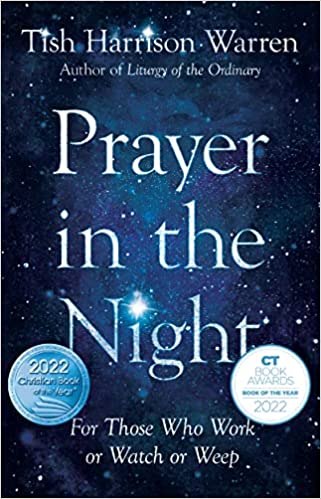This week we are continuing our discussion of the Rev. Tish Harrison Warren’s book Prayer in the Night: For Those Who Work or Watch or Weep. For Tuesday night, please read Chapter 3: “Those Who Weep: Lament.” This chapter begins Part Two of the book “The Way of the Vulnerable “where we pray for those who ‘work or watch or weep this night.’” p.37 If you have time this week, please read Edgar Allan Poe’s poem, The Raven. Rev. Warren opens Part Two with an excerpt from the poem and it is a good modern expression of lament.
The Prayer:
Keep watch, dear Lord, with those who work, or watch, or
weep this night, and give your angels charge over those who
sleep. Tend the sick, Lord Christ; give rest to the weary, bless
the dying, soothe the suffering, pity the afflicted, shield the
joyous; and all for your love’s sake. Amen.
1979 BCP 134
Get a Grip:
Rev. Warren is from Austin, Texas. She begins this chapter with Walker Percy’s observation in 1956 that the South is very much Stoicism with a Christian framework. What she means is that, at least in the South, good manners and suppressing one’s emotions are paramount. Godliness lies in not being obedient to the Scriptures but in maintaining a steadfast and temperate countenance. Miranda Lambert’s 2011 hit song “Mama’s Broken Heart” teaches us the same thing – “Don’t matter how you feel, it only matters how you look . . . get a grip and bite your lip just to save a little face.” (Video and Lyrics).
The downside to this stoicism is a resistance to grief which means we do not learn to grieve ordinary suffering and loss. Rev. Warren writes that growing up she felt that she “didn’t have permission to be sad, to weep, or to mourn.” She was taught to simply muddle through with her comparatively small sorrows. Grief, if allowed, was simply something to get through. “People lose a loved one and then, for a year or two, they grieve.” p.39. Get a grip and bite your lip and move on.
The Persistence of Grief:
Although there is a time for everything, including mourning (Eccl. 3:4), grief itself is a constant. Some losses we simply do not get over. But grief simply is not a response to a great tragedy but meets us every day. Each day, “we bear pain and loss, small disappointments and agonizing memories.” p.39. Even those who maintain an outward steadfast and temperate countenance may suffer from internal sadness. And it is in the quiet and in the solitude of the night that this sadness begins to spill out. We ask God to watch over those who persist in unresolved grief because deep down we know that on one night or another, each of us will suffer from this persistent grief.
Learning to Grieve:
The question she asks, is “what must we do?” She answers that we must learn to weep. She recognizes that none of us want to feel sad. Or if we do experience sadness, we want it to last only a set period of time. And we want to control it. These two conditions, however, are not possible. Rather, as she points out, Jesus tells us that we are called to be a people who mourn. Matt. 5:4. “It’s part of the deal. It’s a defining characteristic of those Jesus called ‘blessed.’”
Part of learning to grieve is making space for our grief to be manifested. Those who mourn are blessed, because unless we grieve “we cannot know that depths of the love of God and the healing God wrings from pain. The way of grieving yields wisdom, comfort, even joy.” (See, Ps. 30:5). If we do not make time to grieve, it will not simply go away. Rather it will manifest itself in “explosive anger, uncontrollable anxiety, compulsive shallowness, brooding bitterness, or unchecked addiction.” p.43. As people of God, we must learn to make time for grief. We must learn to mourn. And we must learn to weep. The how is addressed in the second part of the chapter.
Questions:
Rev. Warren’s discussion questions at the end of the book are:
1. How do you grieve normal or ordinary suffering in your own life? Are there particular practices that have been helpful for you in doing so?
2. What do you do when you feel sorrow or sadness? Are there patterns or habits of distraction or anger that mask sorrow in your life? Where do you think you’ve learned these strategies for avoiding grief?
3. The author quotes Lauren Winner, who says, “What churches do less well is grieve. We lack a ritual for the long and tiring process that is sorrow and loss.” Is this true in your experience of the church? Have you ever seen the church grieve well or beautifully?
4. Is night a time when you find grief bubbling up or getting louder? Why or why not?
Dinner:
We have a special dinner on Tuesday night at 6pm. The dinner will be catered by Winna’s Kitchen. Winna’s is dedicated to helping feed anyone who is hungry through the number one menu item program (see the top right corner). Over New Year’s, Winna’s suffered major damage from frozen pipes. While their dining room is closed for the foreseeable future, their kitchen is still functional and they are catering meals to help fund the number one program. Tuesday night’s dinner will be chicken pot pie and salad provided by Winna’s. Any donations to the “dinner jar” will be given to Winna’s owner Jess and her daughter so they can continue in their ministry of “easing hunger and restoring dignity to our community.”
And the lamp-light o’er him streaming throws his shadow on the floor;
Edgar Allan Poe
And my soul from out that shadow that lies floating on the floor
Shall be lifted – nevermore!


Pingback: Prayer in the Night – Those Who Watch: Attention – Ancient Anglican